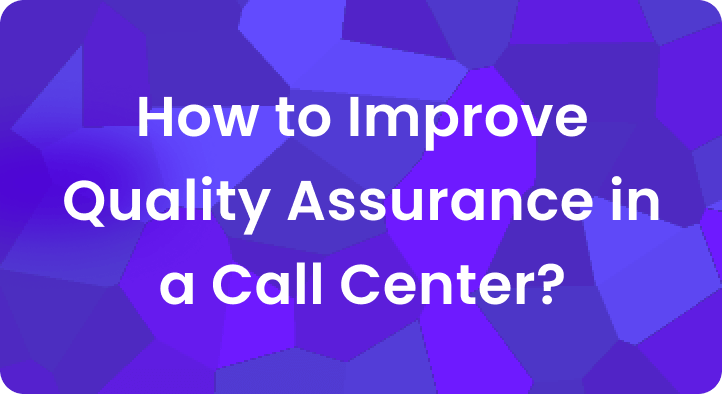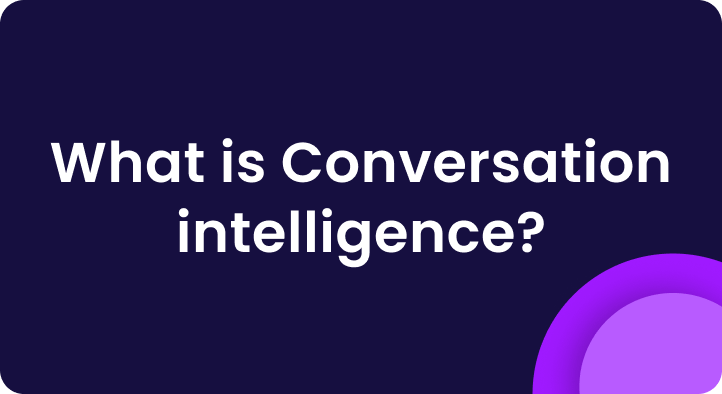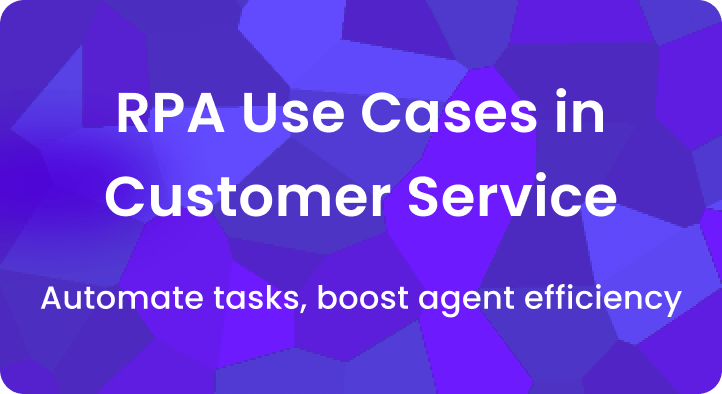Did you know that 74% of consumers are at least somewhat likely to buy based on experiences alone.
Therefore, businesses need to deliver exceptional customer service to their customers.
Excellent customer service helps companies boost satisfaction, foster loyalty, and increase the likelihood of repeat purchases.
Contact center agents are the heroes of customer support who handle this vital task for you.
From answering questions to resolving issues, upselling products, and ensuring compliance, they are integral to creating seamless customer experiences that strengthen relationships and build trust.
In essence, these agents truly are the backbone of a thriving business.
Whether you’re someone looking to pursue a career as a contact center agent, customer service agent, or a manager in charge of assessing agent performance, understanding the core responsibilities, necessary skills & qualifications, and effective evaluation techniques for contact center agents is crucial.
A. What is a contact center agent?
Contact center agents are employees who handle customer interactions across multiple channels, including phone calls, emails, chats, and social media, providing support, resolving issues, and ensuring customer satisfaction.
Also known as call center agents or representatives, these professionals play a crucial role in maintaining customer satisfaction and building loyalty by acting as the primary connection between customers and businesses.
Contact center agents may specialize in different roles, most commonly as Inbound Contact Center Agents or Outbound Contact Center Agents, with each role focusing on distinct aspects of customer interaction and engagement.
Inbound agents

Inbound contact center agents are responsible for handling customer inquiries, often addressing questions or complaints.
These agents are focused on solving customer issues, providing excellent service, and ensuring that the customer’s experience is positive.
Outbound agents
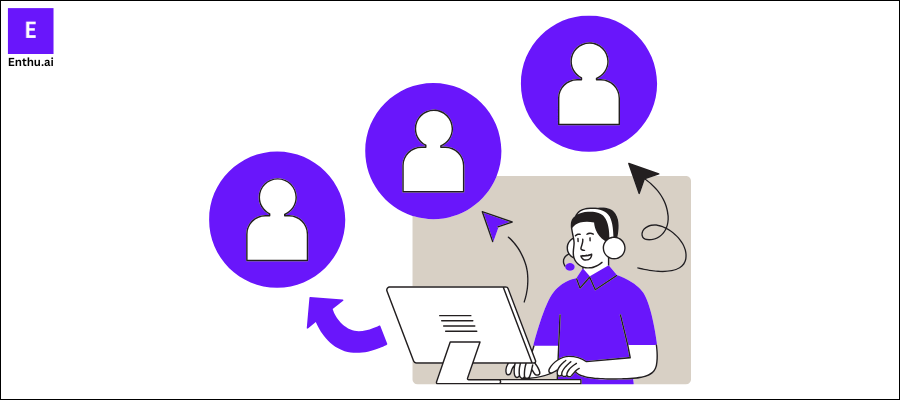
Outbound contact center agents, in contrast, are more focused on proactive outreach to customers or prospects.
They may be responsible for sales, telemarketing, or customer feedback collection.
These agents require strong persuasion skills and resilience, especially since their role often involves overcoming rejection to meet sales targets or other campaign objectives.
B. Key roles and responsibilities of contact center agents
In a contact center, agents are responsible for various tasks to enhance customer experience and support business goals.
Below are 7 key roles and responsibilities that every contact center agent typically takes on in their daily duties.
1. Answering inbound calls
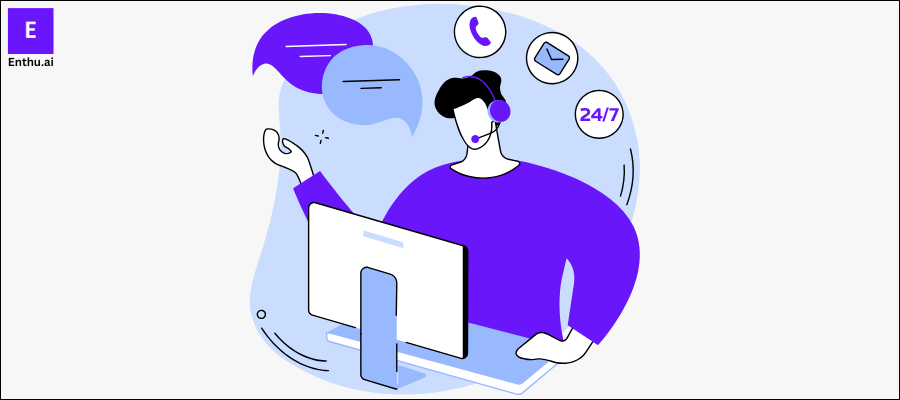
Contact center agents are responsible for both inbound and outbound calls.
These calls play a crucial role in maintaining customer relations, resolving issues, and contributing to the overall sales process.
2. Processing orders and payments
A contact center agent plays a crucial role in order processing and payments.
This involves helping customers place orders, managing payment details, and ensuring accurate and secure transactions.
3. Resolving customer complaints

Dealing with customer complaints is fundamental to a contact center agent’s role.
Complaints can vary from product dissatisfaction to service issues, and the agent is responsible for addressing them professionally and efficiently.
4. Upselling and cross-selling
Upselling and cross-selling are important duties for outbound and sometimes inbound agents, as they aim to increase the company’s sales and improve customer satisfaction by offering more relevant products or services.
5. Conducting market research
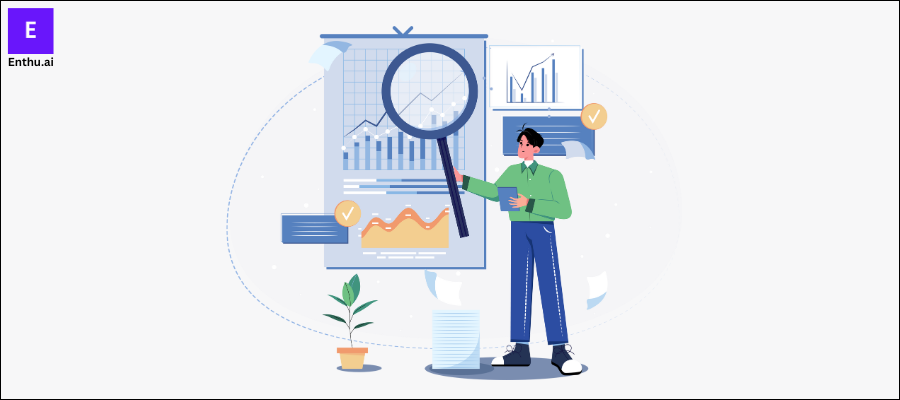
Many contact center agents are responsible for market research, which helps the company gain valuable insights into customer behavior, market trends, and competitive landscape.
This research often involves contacting existing customers and asking for feedback on products or services.
6. Managing customer databases
In a contact center, agents are often tasked with maintaining and updating the customer relationship management (CRM) system or database.
This is essential for providing personalized and efficient service to customers, tracking interactions, and ensuring data is up-to-date.
7. Reporting issues and feedback

Contact center agents play a key role in reporting recurring issues or customer feedback to management.
This reporting helps businesses identify problems early, improve customer service processes, and enhance product offerings.
Role Primary TasksSummary Table: Key Roles and Responsibilities of Contact Center Agents
Answering Inbound and Outbound Calls Answer and resolve inbound customer calls; make outbound calls for sales, follow-ups, and market research; ensure customer satisfaction. Processing Orders and Payments Assist with order placement, process payments securely, and handle refunds, exchanges, and cancellations. Resolving Customer Complaints Address complaints empathetically, provide solutions, and escalate issues when needed. Upselling and Cross-selling Identify and offer relevant upsell or cross-sell opportunities based on customer needs. Conducting Market Research Collect and analyze customer feedback, identifying trends to inform business decisions. Managing Customer Databases Update CRM with customer information, log interactions, and retrieve data for efficient service. Reporting Issues and Feedback Document recurring issues and report patterns to management for improvement. C. Skills and qualifications of contact center agents
To be an effective contact center agent, certain skills and qualifications are essential. These not only help agents provide excellent service but also contribute to the business’s overall success.
Below are the key skills and qualifications that make a great contact center agent:
1. Must-have skills and qualities
- Effective communication: Clear and confident communication is essential for explaining solutions and resolving issues.
- Empathetic listening: Listening actively and understanding the customer’s emotions to provide appropriate solutions.
- Problem-solving: Quickly analyzing and resolving customer issues to ensure satisfaction.
- Product/service knowledge: A deep understanding of the company’s offerings to address inquiries accurately.
- Time management: The ability to prioritize tasks and manage multiple customer requests efficiently.
- Technical skills: Comfort with call center technology and CRM systems to track and manage customer interactions.
- Teamwork: Working effectively with colleagues to provide the best service and ensure customer satisfaction.
2. Nice-to-have qualifications
- Multilingual ability: The ability to speak multiple languages, which enhances communication with diverse customer bases.
- Previous customer service experience: Prior experience in customer service can speed up training and improve efficiency.
- Higher education: A degree in communication, business, or related fields can help agents handle complex tasks and strategies.
- Certifications: Relevant certifications in customer service or sales demonstrate specialized expertise and commitment.
D. How to measure contact center agent performance?
To bring the best out of your call center agents and deliver exceptional customer support, it’s crucial to evaluate and measure their performance.
Effective performance evaluation helps identify strengths, areas for improvement, and ensures that customers are receiving the highest level of service.
Regular measurement also fosters a culture of growth and accountability, enabling agents to continually improve their contact center skills and work efficiently.
Key metrics to evaluate agent performance
1. Agent productivity
- First call resolution (FCR): The percentage of issues resolved on the first contact. High FCR indicates strong performance.
- Average speed of answer (ASA): How quickly agents respond to incoming calls. A low ASA is a sign of efficiency.
- Average handle time (AHT): The total time spent handling customer calls. While important, it should be balanced with customer satisfaction.
- Adherence to schedule: Tracks how well agents follow their schedules, ensuring they are available when needed.
- Calls answered per hour: Measures how many calls an agent handles, helping assess their efficiency.
2. Customer experience
- Customer satisfaction score (CSAT): A direct measure of how happy customers are with the agent’s service.
- Net promoter score (NPS): Reflects how likely customers are to recommend the service based on their experience.
- Customer churn rate: Tracks how often customers stop using the service. A high churn rate can indicate poor customer experiences.
3. Call initiation metrics
- First response time (FRT): Measures how quickly an agent responds when a customer reaches out.
- Call abandonment rate: How many customers hang up before their call is answered. A high abandonment rate signals slow response times.
- Issue resolution rate: Shows the percentage of problems successfully resolved. High-resolution rates indicate effective support.
E. How to evaluate agent performance In 2024?
The importance of AI-powered call center software for evaluating and improving agent performance
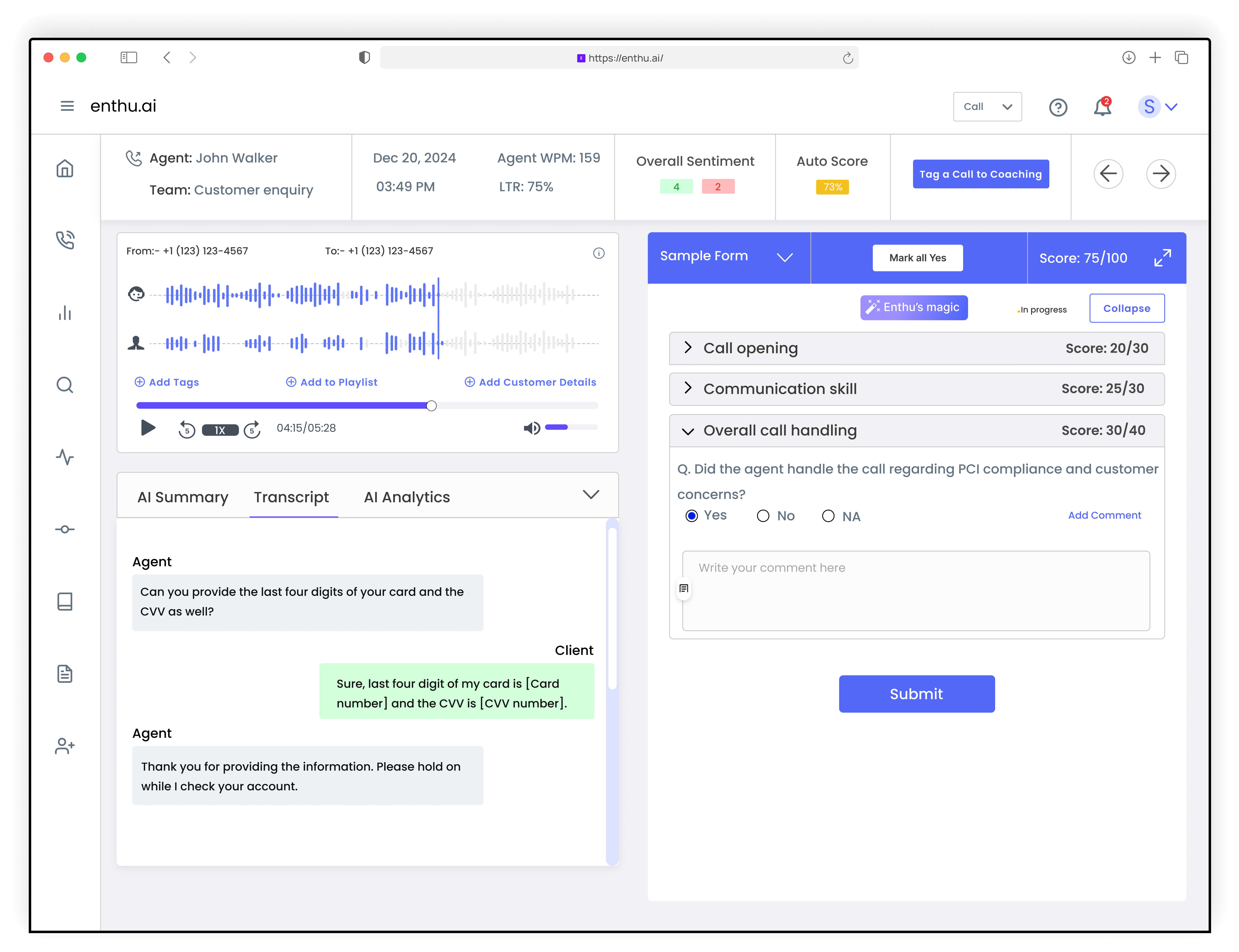
AI-powered call center software is transforming and improving the way agents’ performance is evaluated. Solutions like Enthu.AI offer powerful tools to measure and enhance agent performance in real-time.
Enthu.AI leverages artificial intelligence to provide detailed insights into every customer interaction. Here’s how it helps:
- Call summary: Enthu.AI generates a comprehensive summary of each call, highlighting key moments and providing quick insights into agent performance.
- Call analysis: It dives deep into call data, identifying trends and patterns, making it easy to spot areas where agents need support or additional agent training.
- Sales coaching and training: It helps track customer feedback, run automated quality programs, and pinpoint revenue opportunities, fostering continuous improvement.
- Search phrases: Agents and managers can search through call transcripts for specific keywords, quickly identifying key moments in customer interactions.
- Reporting: Enthu.AI offers intuitive reports that display call center performance metrics in easy-to-read graphs, helping managers track progress and measure success.
With AI-powered solutions like Enthu.AI, call centers can ensure that agents are consistently meeting expectations while continuously improving.
These tools make it easier to objectively evaluate agent performance, identify improvement areas, and drive better customer experiences.
Conclusion
Contact center agents are at the heart of delivering exceptional customer experiences. Businesses can significantly enhance customer satisfaction and loyalty by understanding their key responsibilities.
Equip your team with the right skills and tools, and regularly measure performance for continuous improvement.
Looking to boost your contact center performance?
Discover how Enthu.AI can optimize your operations and enhance both agent skills and customer experience.
Have any questions related to the call center agents? Let us know. We’re happy to help you.
FAQs
1. What is a contact center agent?
A contact center agent is a professional who interacts with customers on behalf of a company, handling inquiries, providing support, and resolving issues across various communication channels like phone, email, live chat, or social media.
2. What is the role of a contact center?
A contact center serves as the central point for managing customer interactions. It handles inbound and outbound calls, provides customer support, resolves complaints, processes orders, and often engages in sales or market research to enhance customer satisfaction and loyalty.
3. Why is a contact center agent important?
Contact center agents are crucial for maintaining positive customer relationships. They are the frontline of a business, resolving issues, providing assistance, and ensuring that customers feel valued, which directly impacts customer satisfaction, brand reputation, and business growth.



 On this page
On this page